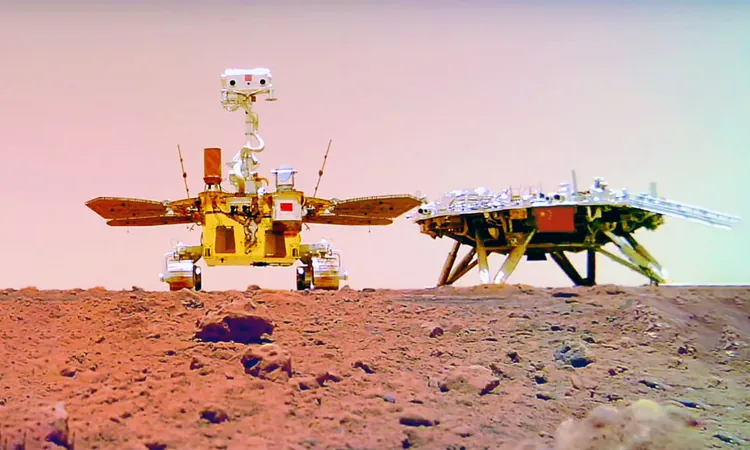
China's Zhurong Rover Uncovers Evidence of Ancient Ocean Shoreline on Mars
2024-11-22
Author: Wei Ling
Exciting Discoveries from Mars
Exciting new findings from China's Zhurong rover are reshaping our understanding of Mars' watery history! After landing in the southern region of Utopia Planitia in May 2021, Zhurong has been tirelessly exploring the Martian landscape, and researchers believe they may have discovered evidence of an ancient ocean shoreline that once thrived in the northern lowlands of Mars.
Research Team and Methods
Led by Bo Wu from Hong Kong Polytechnic University, the team analyzed data from the rover's advanced scientific instruments—ranging from high-resolution cameras to ground-penetrating radar. They have identified several geological features that strongly suggest the presence of a former ocean, believed to have existed around 3.68 billion years ago. "The features we uncovered, including crater-like structures and sediment channels, are consistent with what you might find in a coastal environment," Wu explained.
Zhurong Rover's Capabilities
The Zhurong rover, weighing approximately 240 kilograms (about 530 lbs) and roughly the size of a small car, is China's first venture into Martian exploration. It carries a suite of instruments designed to analyze surface materials, study geological structures, and probe underground layers for potential water ice. This capability is crucial, as the search for water is directly linked to the possibility of life on Mars.
The Hypothesis of a Frozen Ocean
What’s particularly intriguing about this discovery is the hypothesis that this ocean could have frozen over for a period of 10,000 to 100,000 years before eventually drying up. Sergey Krasilnikov, a co-author of the study, noted, "The layering formed in silt-laden water resembles sedimentary structures found in Earth's ancient seabeds, which adds to the compelling nature of our findings."
Controversies Surrounding the Findings
Despite these groundbreaking revelations, the findings are not without controversy. Some scientists, like Benjamin Cardenas from Pennsylvania State University, raise concerns about the preservation of these delicate features over billions of years of erosion. Wu posits, however, that asteroid impacts could have unexpectedly revealed portions of this shoreline, keeping the inquiry lively and compelling.
Implications for Life on Mars
The implications of an ancient Martian ocean extend far beyond geological interest—water is essential for life as we know it. If Mars indeed hosted oceans, it raises the tantalizing question: Could there have been life on the Red Planet? This possibility electrifies researchers, driving them to further study the evidence gathered by Zhurong.
NASA's Recent Findings
Additionally, NASA's Insight lander recently detected water seeping into Mars's crust, adding yet another layer to the narrative. This discovery suggests that there are potentially habitable environments below the surface that could support life.
Future Missions to Mars
As we look to the future, China's Tianwen 3 sample return mission aims to collect Martian material and bring it back to Earth by 2031. This mission holds the promise of providing definitive answers about Mars's history and its capacity to harbor life—if all goes according to plan, we might hold pieces of Mars in our hands by the next decade!
Conclusion and Future Prospects
As Zhurong continues to transmit invaluable data, scientists across the globe remain on the edge of their seat, eager to unravel the mysteries of Mars. Could this planet once be alive with activity? Only time and future research will reveal the truth!
Stay Tuned!
The adventure is just beginning!




 Brasil (PT)
Brasil (PT)
 Canada (EN)
Canada (EN)
 Chile (ES)
Chile (ES)
 España (ES)
España (ES)
 France (FR)
France (FR)
 Hong Kong (EN)
Hong Kong (EN)
 Italia (IT)
Italia (IT)
 日本 (JA)
日本 (JA)
 Magyarország (HU)
Magyarország (HU)
 Norge (NO)
Norge (NO)
 Polska (PL)
Polska (PL)
 Schweiz (DE)
Schweiz (DE)
 Singapore (EN)
Singapore (EN)
 Sverige (SV)
Sverige (SV)
 Suomi (FI)
Suomi (FI)
 Türkiye (TR)
Türkiye (TR)